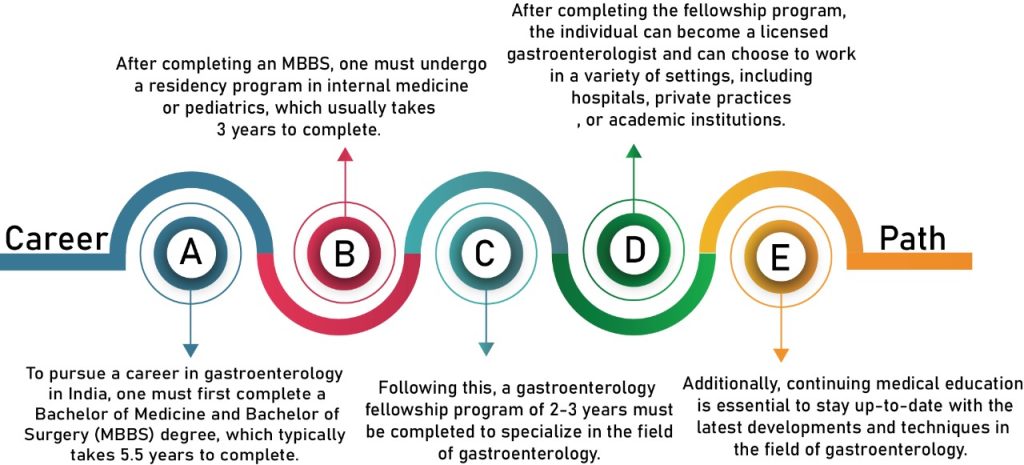Gastroenterology is a medical specialty that focuses on the digestive system, including the esophagus, stomach, small and large intestines, liver, gallbladder, and pancreas. Gastroenterologists diagnose and treat a wide range of conditions and diseases that affect the digestive system, such as acid reflux, ulcers, inflammatory bowel disease, liver disease, and cancer. They use a variety of techniques to diagnose and treat these conditions, including endoscopy, colonoscopy, imaging tests, and medications. Gastroenterology plays an important role in maintaining digestive health and preventing serious complications.

Work description
Gastroenterologists work with patients who may experience symptoms such as abdominal pain, nausea, vomiting, and diarrhea, as well as those who require screening for digestive diseases such as colon cancer.
Gastroenterologists perform procedures such as endoscopies and colonoscopies to visualize the digestive tract and take tissue samples for analysis. They also interpret results from imaging tests and laboratory tests to diagnose and monitor diseases such as inflammatory bowel disease, liver disease, and pancreatic disorders.
Treatment options may include medications, lifestyle modifications, or surgical procedures, depending on the condition.
Gastroenterologists work closely with other medical professionals, such as nutritionists and colorectal surgeons, to provide comprehensive care for their patients.
High Demand
Gastroenterology is a highly specialized field, which can provide job security and competitive salaries.
Lucrative salaries
Gastroenterologists have the opportunity to make a significant impact on patient health and quality of life.
Opportunities for innovation
The field is constantly evolving, with new advancements in technology and treatments being developed, which can provide intellectual stimulation and professional growth.
Versatility
Gastroenterologists have the ability to work in a variety of settings, including hospitals, private practices, and academic institutions.
Flexibility
There is a high demand for gastroenterologists, especially in areas with an aging population.
Job satisfaction
The potential to specialize in areas such as sustainable design, structural engineering, or building systems design.
High stress
Gastroenterology training can be lengthy and intensive, requiring several years of specialized education and training.
Long hours
The nature of the work can be demanding, with long hours, on-call responsibilities, and a fast-paced clinical environment.
Competitive field
The work can be emotionally taxing, as gastroenterologists often deal with patients who are experiencing pain and discomfort.
Constant learning
There is a risk of exposure to infectious diseases, as gastroenterologists work closely with bodily fluids and perform procedures that can transmit infections.
Isolation
- There is a risk of burnout, as gastroenterologists may experience high levels of stress and pressure to maintain a high level of performance.
Eye strain and other physical health issues
The potential for competition for jobs, particularly in areas with high demand for architectural engineering services.
The cost of pursuing a career in gastroenterology in India can vary depending on factors such as the type of course or training program, the institution providing the education, and the living expenses of the student.
Generally, a Bachelor of Medicine and Bachelor of Surgery (MBBS) degree is required to become a gastroenterologist, which can cost around INR 5-10 lakhs for the entire course. After completing an MBBS, a gastroenterology residency program typically takes 3 years to complete and can cost anywhere from INR 15-25 lakhs in total.
Additionally, there may be costs associated with books, equipment, and exam fees. Overall, pursuing a career in gastroenterology in India can require a significant financial investment, but the potential for a rewarding and lucrative career may make it a worthwhile choice for some individuals.
[wpcharts type=”horizontalbarchart” bgcolor=”red:gray:yellow,blue:gray:yellow,random:gray:yellow,purple:gray:yellow” min=”0″ legend=”true” titles=”2 year , 5 year” values=”3,7,5,12″]
The earning potential for gastroenterologists in India can vary depending on factors such as experience, location, and the type of employment. Generally, gastroenterologists in India can expect to earn a median salary of around INR 10-20 lakhs per year. However, those with more experience and expertise may be able to earn higher salaries, with some senior gastroenterologists earning salaries in excess of INR 50 lakhs per year. Gastroenterologists working in private practice may also have the potential to earn more than those working in a hospital or academic setting. Overall, gastroenterology can be a lucrative career in India, with the potential for high salaries and job stability.
[wpcharts type=”horizontalbarchart” bgcolor=”red:gray:yellow,blue:gray:yellow,random:gray:yellow,purple:gray:yellow” min=”0″ legend=”false” titles=”Entry-Level, Mid-Career, Senior-Level ” values=”5,15,25,35,45,55″]
Strong academic performance in science and medicine-related subjects.
Excellent communication skills to effectively communicate with patients and colleagues.
Attention to detail and ability to analyze complex medical data.
Good hand-eye coordination for performing endoscopic procedures.
Patience, empathy, and compassion to provide care for patients who may be experiencing discomfort or pain.
Ability to work well under pressure and handle stressful situations.
Ability to work well in a team environment, collaborate with others, and provide leadership when necessary.
Poor academic performance in science and medicine-related subjects.
Lack of attention to detail, which can lead to errors in diagnosis or treatment.
Inability to handle stressful situations, which can impact patient care and safety.
Inadequate communication skills, which can result in misunderstandings with patients or colleagues.
Poor hand-eye coordination, which can affect the ability to perform endoscopic procedures accurately and safely.
Lack of patience, empathy, or compassion, which can lead to a negative patient experience and impact the quality of care provided.
A lack of attention to detail, which can lead to errors and safety issues in designs.
Work-life balance
The work-life balance for gastroenterologists can vary depending on the type of employment, the setting in which they work, and the demands of their job.
Gastroenterologists who work in a hospital or academic setting may have more regular working hours, while those in private practice may have more flexible schedules but may also be required to work longer hours or be on call.
Additionally, gastroenterologists may have to work weekends or holidays to accommodate the needs of their patients. However, advances in technology and procedures have made it possible for gastroenterologists to provide care remotely, which can improve work-life balance by reducing the need for long hours at the hospital.
Overall, while gastroenterology can be a demanding career with some challenges to work-life balance, it is possible to find a balance with careful planning and time management.

Provides specialized care for patients with digestive system disorders and diseases, improving their quality of life.
Helps to diagnose and treat a wide range of gastrointestinal disorders, from minor issues to life-threatening conditions.
Contributes to the advancement of medical knowledge and techniques in the field of gastroenterology.
Provides opportunities for research and publication of findings in medical journals, leading to further advancements in the field.
Can provide a lucrative and rewarding career path with job stability and growth opportunities.
Contributes to the healthcare industry and improves public health by reducing the burden of digestive system disorders on society.
Hepatology
A subspecialty of gastroenterology that focuses on the liver, gallbladder, and pancreas.
Inflammatory bowel disease (IBD)
A subspecialty of gastroenterology that focuses on the diagnosis and treatment of conditions such as Crohn’s disease and ulcerative colitis.
Motility disorders
A subspecialty of gastroenterology that focuses on conditions that affect the muscles and nerves of the digestive tract, leading to problems with movement and function.
Pediatric gastroenterology
A subspecialty of gastroenterology that focuses on the diagnosis and treatment of conditions related to the pancreas, such as pancreatitis and pancreatic cancer.
Therapeutic endoscopy
A subspecialty of gastroenterology that focuses on the diagnosis and treatment of digestive disorders in children.
Conclusion:
In conclusion, gastroenterology is a specialized medical field that offers a range of career opportunities with job stability, good earning potential, and the ability to improve patients’ quality of life. While pursuing a career in gastroenterology requires a significant investment of time and resources, it can be a rewarding career path for those with a passion for digestive health and patient care. With various specializations available, individuals can find a niche that aligns with their interests and skills.



